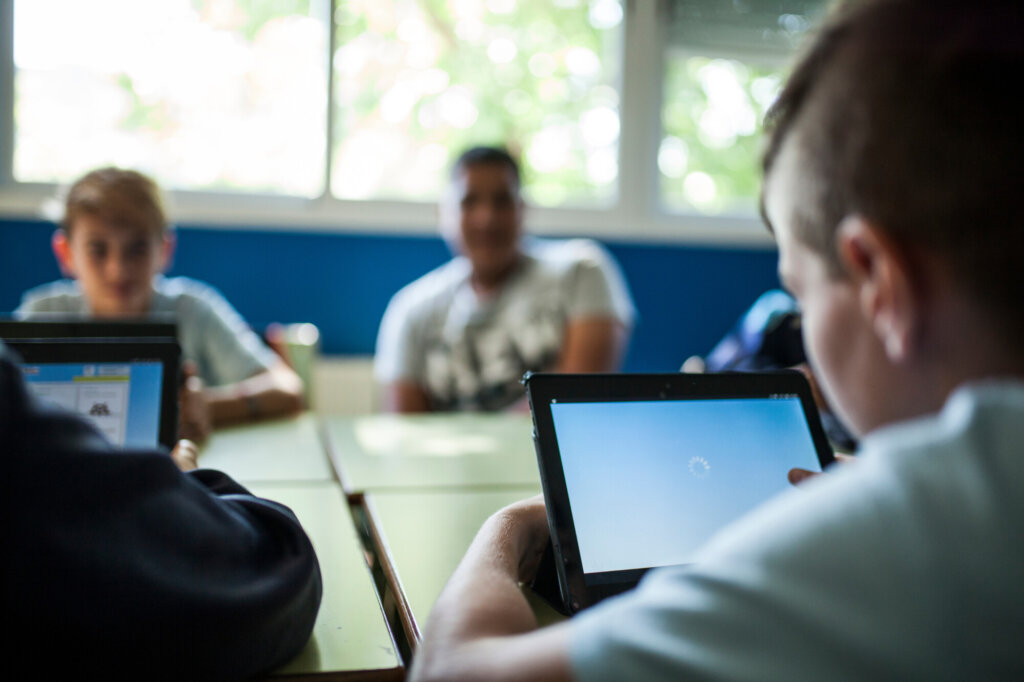6 Free Digital Safety and Digital Wellness Resources for Parents and Educators
With more schools issuing tablets and laptops to students and integrating devices into education, time in the classroom can also mean more time online for many young people. According to the National Institute of Health, 53% of children have a smartphone by age 11, and over 95% of teens have access to a smartphone. Ninety-four percent of public schools report providing tablets or laptops to students who need them, according to survey results from the U.S. Department of Education’s National Center for Education Statistics. While nearly three-quarters of respondents, or 72%, said their school offers digital literacy training for students, how much information students are getting about hypersexualized media and other digital threats is less clear.
Mainstream, violent, explicit pornography is widely available to young people and easily accessed from any device with an internet connection. Much of this content is misleading, degrading, and objectifying, resulting in a dangerous trifecta that shapes young people’s perception of consent, sexual violence, gender equality, sexuality, and intimate relationships at a young age and without any context.
Parents and educators can understandably feel helpless to act in this pervasive culture. But the truth is, they’re perfectly positioned to offer children alternative, healthy messages about sex that instill respect in themselves and others. Young people need trusted adults to help them build resilience and resistance to hypersexualized media and porn.
To help fill this need, Culture Reframed created a list of free resources to ensure the online safety of young people of all ages in the digital spaces they are learning to navigate. With the right information and guidance, we can help young people build resilience and resistance to hypersexualized media and pornography so they can develop healthy, respectful, and egalitarian views of sex and intimacy. Check out these resources for parents, caregivers, and educators, including science-based courses and tools to address the harms of pornography to youth.
Parent’s Guide to Supporting Family Online Safety: Anything that is not age-appropriate — games, social media, apps, videos, websites — puts children at risk for online abuse, cyberbullying, contact with predators, and encountering disturbing content that exceeds their level of social and emotional maturity. Check out this guide to learn about setting safe boundaries for kids online.
Parents of Tweens Course: Develop confidence to help your tween navigate the tricky terrain of hypersexualized culture. This free self-paced course is divided into five sections and 13 modules and is aimed at parents of kids aged 9 to 12.
Parents of Teens Course: This free course guides parents through topics that provide skills to build teens’ resilience and resistance to hypersexualized culture and the impacts of pornography. This self-paced course is divided into 12 modules and is aimed at parents of kids aged 13 to 18.
Promoting Digital Wellness: Smartphones, tablets, and computers are omnipresent in society and nearly impossible to avoid. Young people must learn how to develop a healthy relationship with technology. Digital wellness benefits both physical and emotional health, especially for children and adolescents whose vulnerable brains are in critical stages of development. This article provides helpful guidance on digital wellness, digital literacy, and additional resources to empower young people against the potential dangers of digital media.
Effects of Porn on Youth: The research on porn’s harmful impact on youth is clear. This fact sheet presents recent research on the emotional, behavioral, and sexual harms of pornography to children, adolescents, and teens. This includes the impact on sexual behavior, general behavior, as well as emotions and thoughts.
Porn-Critical Sex Ed Curriculum: This free and fully customizable curriculum is designed for educators and other professionals who teach sex ed to young people, specifically ages 13 and up. It includes training modules, anti-exploitation education lessons, sex and relationship education lessons, and digital media literacy sessions. With downloadable lesson plans and PowerPoint presentations, it is user-friendly and full of relevant media examples, links, and resources to support both teachers and students.

